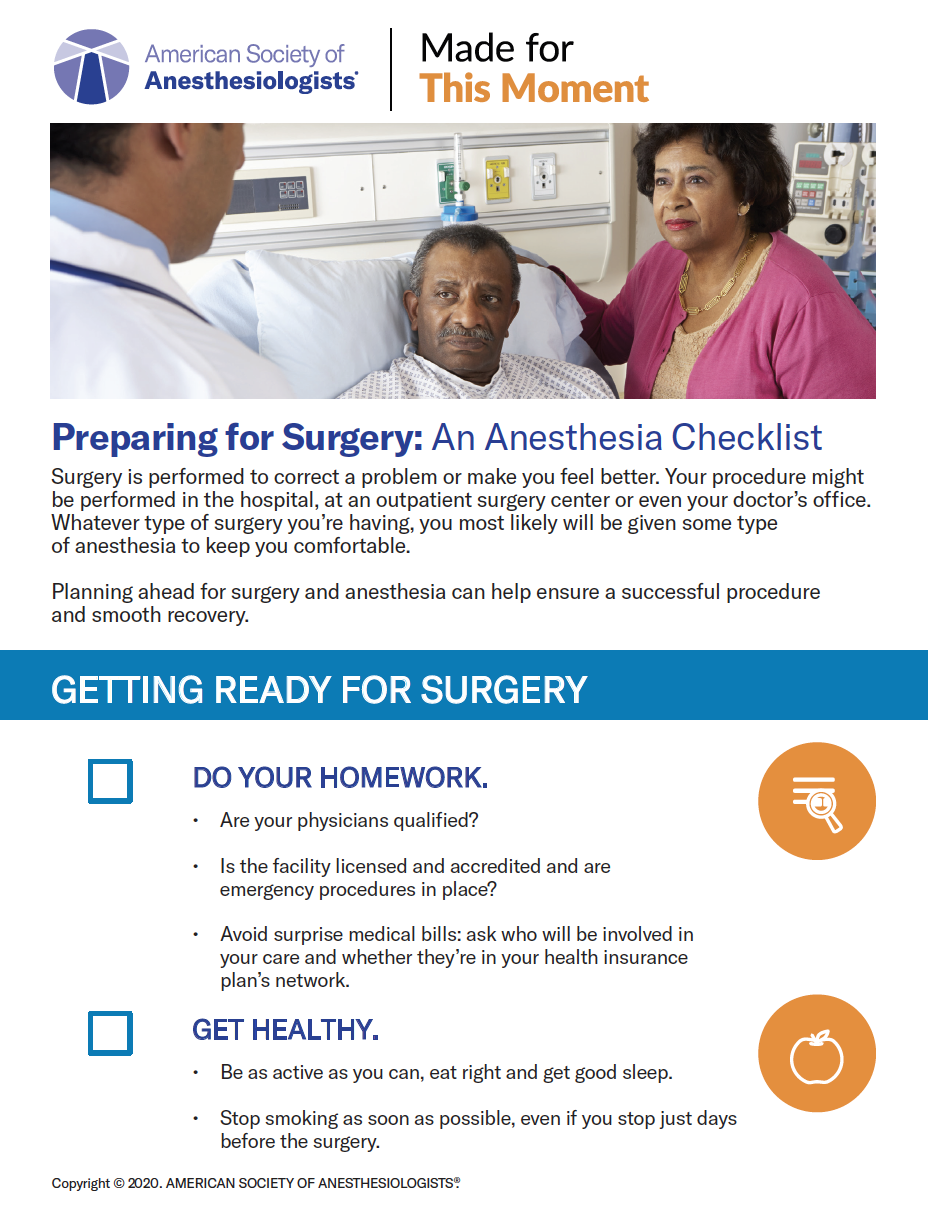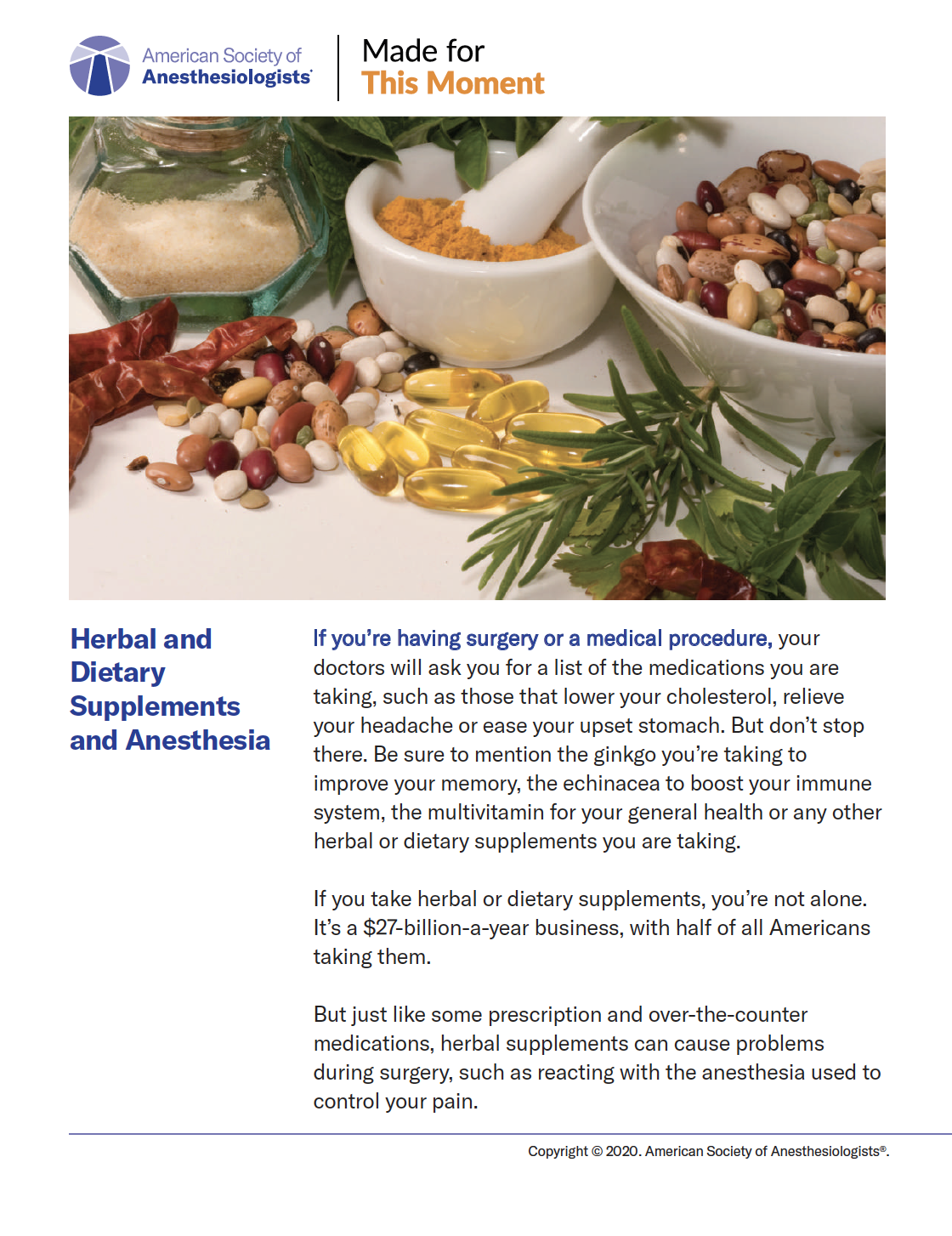what is a time out prior to surgery
Preparing for Surgery
If you're planning to take surgery, yous'll want to spend some time preparing. That means taking care of your health, learning as much as you tin about the procedure and getting to know the people who will be taking care of you. Planning ahead tin can help ensure you accept a successful procedure and heal faster with a smooth recovery.
Planning ahead can assistance ensure you take a successful process and heal faster with a smoothen recovery.
What should you practise to fix for surgery?
There are several steps you should take before your surgery then y'all'll feel as relaxed and confident as possible. Get-go with answering these questions:
- Are your physicians qualified?Ask your physicians almost their experience performing the specific process yous are having to brand sure they are qualified with the advisable medical pedagogy and training.
- Is the facility licensed and accredited, and are emergency procedures in identify? If you are having surgery exterior of a hospital — at an outpatient facility or your md's office — exist sure it's licensed (check with your country's health section) and accordingly accredited by an system such as The Articulation Committee, the Accreditation Association for Ambulatory Health Care (AAAHC), or the American Association for Accreditation of Ambulatory Surgery Facilities (AAAASF). As well brand sure the facility has medications, equipment, and procedures in identify to handle emergencies, particularly if there is no emergency facility nearby.
- Who volition provide the anesthesia?Be sure your anesthesia intendance is led by a doctor anesthesiologist. A physician anesthesiologist is a medical doctor who specializes in anesthesia, hurting management, and critical care medicine, and works with your surgeon and other physicians to develop and administer your anesthesia care plan. With 12 to 14 years of instruction and 12,000 to 16,000 hours of clinical training, these highly trained medical experts play a fundamental function in your care. They meet with you earlier surgery, closely monitor your anesthesia and vital functions during the procedure, and take intendance of you later on to assure your recovery is polish and your hurting is controlled.
- Am I as healthy every bit I tin exist? Spend the fourth dimension before the process beingness as active as y'all can, eating right and getting skillful sleep. If you fume, stop as soon every bit possible — even if it'south just a solar day or two before surgery — because smoking can cause bug with animate and recovery from anesthesia and surgery. Other steps you take will be guided by your meetings with the medical team, including the physician anesthesiologist.
- How do I avert surprise medical bills?While your wellness and safety are your priorities, it'southward also of import to brand sure your insurance coverage is in order earlier surgery so y'all don't receive any unexpected bills. "Surprise medical bills" are caused by "surprise insurance gaps" that occur when your insurance plan offers a low premium but limits the number of physicians in the program's network. Before having a medical procedure, ask who volition be involved in your care and whether they're in your plan's network. Call your insurance company to verify that the hospital or medical center and each medico and provider caring for y'all are in-network.

Preparing for Surgery: An Anesthesia Checklist
Download and impress this checklist with the steps y'all tin can take to help ensure a successful surgery.

What practice you lot talk about with the dr. anesthesiologist?
Sometime earlier the day of your surgery, you lot should encounter with your physician anesthesiologist then he or she tin can gather data that will help determine the correct anesthesia care plan for you. Go to the meeting prepared to talk over your medical history, your health habits, and your past experiences with surgery and anesthesia. Be sure to discuss these things in detail:
- Your health habits andmedications. Tell your md anesthesiologist all about your health, such as how physically active you are, and if you have chronic health issues, such as asthma or other lung problems, diabetes, heart illness, liver or kidney disease, allergies, or whatever other medical weather. Be sure to mention if yous snore or have other sleep issues; these may be symptoms of obstructive sleep apnea, which can make surgery and anesthesia more dangerous. Provide a list of all prescription and over-the-counter medications, supplements, and vitamins you lot accept. Your physician anesthesiologist might tell yous to stop taking some of them.
- Your use of alcohol or recreational drugs.The use of recreational drugs such as alcohol, marijuana, narcotics, and stimulants should be discussed. These substances tin affect how yous react to anesthesia and the type and corporeality you'll need.
- Your experience with anesthesia. Tell the doctor anesthesiologist if you or a family unit member has had a bad reaction to anesthesia or pain medication, and make them aware of any anesthesia side effects you've experienced — even if they occurred years ago. Also mention if you've ever had a stroke or have experienced estrus stroke.
- Your fears. Information technology'south natural to fear surgery and anesthesia. If you lot're afraid, tell your dr. anesthesiologist. He or she can give you information to ease your mind and assistance you feel prophylactic.
- Your questions. Bring written questions to your coming together. Write down the answers, because information technology's difficult to remember everything yous hear. Bring a friend or family member who tin can take notes and ask questions, also as provide information you may not have thought of.
- Your recovery. The dr. anesthesiologist continues to intendance for y'all after surgery, so ask near how any pain will be managed and any concerns you take about recovery, returning domicile, and getting back to your normal routine.

Herbal and Dietary Supplements and Anesthesia
Learn how some supplements can affect the anesthesia used to control your pain during surgery or create other surgery-related complication.
What should you expect right before surgery?
As the 24-hour interval of the process arrives, plan to:
- Follow pre-surgery directions and diet. Unless you're having only local anesthesia, you may be told not to eat or drink anything later on midnight before your procedure. This is because of the rare gamble of food or liquid in your stomach getting into your lungs while you're under sedation or general anesthesia. Inquire your doc anesthesiologist for guidance; you may be told you can drink articulate liquids and take your regular medications.
- Bring a friend. You won't be immune to bulldoze after outpatient surgery, or even later on a few days in the hospital if you're taking pain medication. Program to have someone take you domicile.
- Wear comfortable vesture. Wearable or bring loose-plumbing fixtures clothing. Your body might be sore or bloated from surgery, or you may have bulky bandages over your incisions. Go out jewelry and valuables at home.

Md anesthesiologists work with your surgical squad to evaluate, monitor, and supervise your intendance earlier, during, and after surgery—delivering anesthesia, leading the Anesthesia Care Team, and ensuring your optimal rubber.
Source: https://www.asahq.org/madeforthismoment/preparing-for-surgery/prep/preparing-for-surgery-checklist/
0 Response to "what is a time out prior to surgery"
Post a Comment